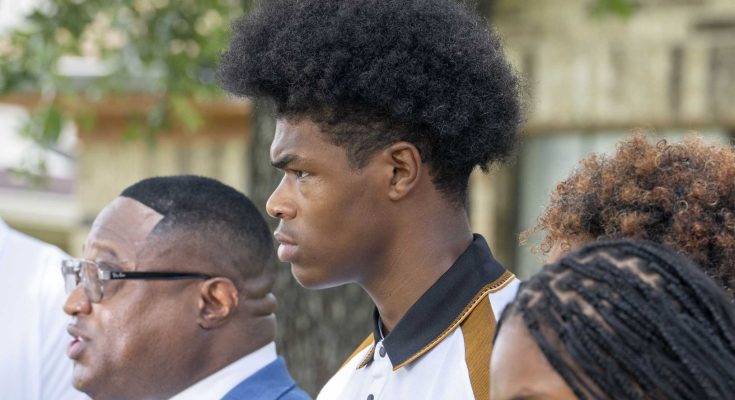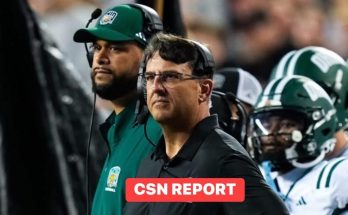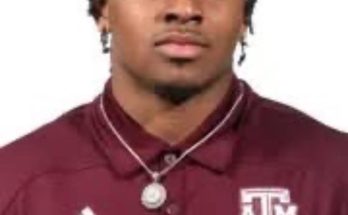Georgia Bulldogs football commit Chace Calicut, a highly touted defensive back prospect for the Class of 2025, is at the center of a rapidly unfolding legal controversy that has stunned the college football world and raised urgent questions about justice, youth accountability, and the broader treatment of Black athletes in America’s legal system. Calicut, who had been riding a wave of praise as one of Georgia’s more promising future defenders, is now facing a felony aggravated assault charge stemming from an alleged road rage incident that took place earlier this month in suburban Atlanta. The incident has drawn national attention not only because of Calicut’s high-profile football status but also due to the troubling circumstances and conflicting reports surrounding the case.
According to the police report filed by the Cobb County Police Department, the 17-year-old Calicut was allegedly involved in a confrontation that escalated when a firearm was displayed from a vehicle during a road altercation near Windy Hill Road on the evening of July 13. Authorities contend that Calicut was behind the wheel of a black Dodge Charger when the incident occurred and that a passenger in the vehicle brandished a weapon in a threatening manner at another driver during a dispute that began with tailgating and aggressive lane switching. Calicut was arrested at the scene after police conducted a brief pursuit and detained all occupants of the vehicle.
While no injuries were reported, prosecutors have charged Calicut with felony aggravated assault, claiming that by driving the vehicle during the incident and allegedly failing to stop the assault, he played an instrumental role in endangering the life of the other driver. Calicut was initially booked into the Cobb County Youth Detention Center and held on \$75,000 bond, but during a bond hearing held on July 26, the judge doubled the amount to \$150,000 citing concerns over public safety and the potential for flight risk. The decision has sparked fierce debate online and within civil rights circles, with many questioning whether the rising athlete is being used as an example amid broader tensions around youth crime, policing, and race.
What has only added to the firestorm is a competing narrative being voiced by Calicut’s family and a prominent Atlanta-based activist, Reverend Terrance J. McAllister, who held a press conference outside the courthouse just hours after the bond ruling. Reverend McAllister, who heads the Justice for Youth Equity Coalition, stated that Chace Calicut was not the one who initiated the incident and that the teenager had been “coerced and manipulated” by older peers into driving the car that evening. “We’re talking about a child with no prior record, who has never held a weapon, who was intimidated and pressured to be a driver in a situation he neither started nor could control,” said McAllister. “To saddle this young man with a felony charge before the facts are fully aired is not justice, it’s a rush to criminalize another Black teenager with promise.”
Calicut’s legal team echoed these sentiments in a motion filed with the court, asserting that their client was not aware a weapon was in the vehicle and that he attempted to de-escalate the situation before police arrived. Attorney Monica Price, who represents Calicut, stated that her client had no role in the alleged brandishing of the weapon and has been fully cooperative with investigators. “Chace is a scholar-athlete with a 3.8 GPA, zero disciplinary history, and a full scholarship to the University of Georgia,” she said. “To conflate his presence with culpability under the aggravated assault statute is a miscarriage of legal interpretation and decency.”
The University of Georgia, meanwhile, has issued a terse statement acknowledging the incident and saying they are “monitoring the situation closely.” As of now, Calicut remains a commit to the Bulldogs, though there has been speculation that the university may revisit his scholarship offer depending on how the legal case progresses. Sources within the Georgia athletic department indicate that head coach Kirby Smart and athletic director Josh Brooks have both been briefed on the situation, but the administration is currently taking a “wait-and-see” approach. However, in today’s high-stakes world of college athletics, where public image can make or break both careers and programs, the case has become a volatile one that threatens to ripple beyond the courtroom.
On social media, reaction has been sharply divided. Some fans and community members have rallied to Calicut’s defense, using hashtags such as #JusticeForChace and #LetTheFactsComeOut to voice support and raise awareness about the complexities of the case. Others, however, have argued that involvement in any situation involving firearms and public endangerment—regardless of one’s future or perceived innocence—warrants serious legal consequences. “If this was any other teenager without a football future, there would be no hesitation to charge and detain,” one user wrote on a Georgia sports forum. “He’s not above the law just because he can run a 4.4.”
But those who know Calicut personally have pushed back against such sentiments, describing the teen as quiet, driven, and intensely focused on both academics and athletics. His high school coach at Langston Hughes High, Coach Derrick Waters, offered an emotional defense of his player, saying that the Chace he knows “would never intentionally hurt anyone.” Waters said, “Chace is the kid who stays after practice to mentor freshmen, who helps clean up the locker room without being asked. He’s a leader. If he’s in trouble, we need to understand the full story before rushing to ruin his future.”
The complexities of the legal system, especially when applied to minors, are at the heart of this case. Georgia law does permit minors to be charged as adults in certain felony cases, especially those involving violence or weapons. The prosecution, led by Assistant District Attorney Malcolm Dunn, has signaled that it intends to move forward with the adult charge, citing the “serious nature of the offense and the need for community deterrence.” During the bond hearing, Dunn stated, “This was not a youthful indiscretion. This was an incident that could have resulted in a tragedy. We cannot turn a blind eye because of his athletic future.”
Still, questions linger about whether the legal apparatus is being applied too forcefully in a case that may ultimately hinge on association rather than intent. Advocates have pointed to the rise in such cases across the country, where teens—particularly Black males—are charged under accomplice liability doctrines in situations where they did not pull a trigger or commit direct harm. These laws, sometimes referred to as “felony murder-lite” statutes, have drawn increasing criticism from reformers who say they often punish presence more than action.
For Calicut, the stakes couldn’t be higher. If convicted, he could face years in prison and the collapse of a future that many had projected would lead to the NFL. Even a plea deal or deferred adjudication could be enough for Georgia to walk back its scholarship offer. More importantly, the psychological toll of such charges on a teenager cannot be underestimated. Experts note that the legal trauma, public shame, and sudden fall from grace can have lifelong consequences, even if the charges are eventually reduced or dismissed.
As the legal process moves forward, the story of Chace Calicut is far from over. His next court date has been scheduled for August 19, where the defense plans to argue for bond reduction and the potential transfer of the case to juvenile court. Meanwhile, civil rights groups are preparing a rally in support of Calicut outside the Cobb County Courthouse and have launched a petition demanding a full independent review of the charges. Whether this case becomes another flashpoint in America’s ongoing struggle with justice and race remains to be seen, but one thing is certain: a young man’s future now hangs in the balance—and how this story unfolds will leave a lasting imprint on all who are watching.



